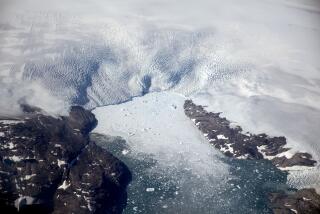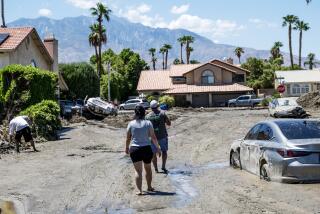Category 5 warning
If the 2007 Atlantic hurricane season ended tomorrow, we would still call it extraordinary. The year’s first two hurricanes, Dean and Felix, both reached Category 5 classification. That’s a record, one among many that these two storms helped establish. To begin with, in the archives (which go back to 1851, with varying degrees of completeness) only three other seasons -- 1960, 1961 and 2005 -- had more than one of these monster storms. And no season can rival this additional feat: Both Dean and Felix struck land at full Category 5 strength. There hadn’t been a Category 5 landfall in what hurricane experts call the Atlantic basin (the Caribbean, the Gulf of Mexico and the Atlantic north of the equator) since 1992’s Hurricane Andrew ravaged southern Florida. Now we’ve seen two in two weeks.
The scariest factoid, however, is this: We’ve now witnessed eight Category 5 hurricanes in the Atlantic basin in the past five years (Isabel, Ivan, Emily, Katrina, Rita, Wilma, Dean and Felix). You have to go back to the 1960s, with six recorded Category 5s, to find another decade that even approaches the present one in this regard. (And if you look beyond the Atlantic? In June, Cyclone Gonu was a Category 5 and the strongest storm ever observed in the Arabian Sea.)
In the face of all this, it’s inevitable that global warming comes up. While each individual storm’s immediate environment -- water temperature, atmospheric patterns -- will always determine its maximum strength, many scientists expect hurricanes to become more intense on average as global warming adds more heat to the tropical oceans. The question now -- or more precisely, the argument -- turns on whether that has already happened: Are the changes detectable? And, if they are (or aren’t), what do we do about it?
For several years, experts have been hotly debating the nuances of the hurricane-climate relationship. An apparent trend toward stronger hurricanes (more Category 4 and 5 storms) seems most indisputable in the Atlantic region, with the dramatic 2005 season -- featuring four Category 5s and the most intense Atlantic hurricane ever (Wilma) providing a kind of exclamation point. Yet some scientists attribute the recent hyperactivity to an ocean-driven up-and-down cycle rather than to a changing global climate. After all, the 1960s also saw lots of very strong hurricanes.
Skeptics of a strong hurricane-climate linkage also assert that our records have some apples-and-oranges issues, as a result of changing measurement techniques over time. For example, Chris Landsea of the National Hurricane Center argues that 50 years ago, Hurricane Dean may have been classified as a mere Category 3 storm: If a storm hit a relatively unpopulated stretch of coast, as Dean did, there wouldn’t have been a lot of land-based measuring devices in place, and aircraft would have been afraid to penetrate a storm’s eye and sample its true strength. So even though this decade may hold the “record” for the most Category 5 storms, we must remember that a record is only what’s recorded. It’s no great leap to imagine that some very strong storms from the 1960s might be underclassified in our database.
And so even as monster storms slam our coastlines, the hurricane-climate debate -- like so many other scientific debates that are highly relevant to political decision-making -- remains shot through with uncertainty. It’s frustrating if you want to chart an appropriate public response. But uncertainty needn’t be entirely unproductive. It needn’t leave us paralyzed.
Just because we can’t reach scientific conclusions beyond a reasonable doubt about hurricanes and climate doesn’t mean that, as citizens or as policymakers, we can’t say anything at all. When you see data that are not just anomalous (which is to say record-breaking) but anomalous in such a way that they fit scientists’ predictions, it would be foolish not to take note.
Although no single event can serve as direct evidence of changing climate, hurricane intensity records are, nevertheless, suggestive. To be sure, weak words like “suggestive” aren’t easy for citizens or policymakers to mobilize behind. These days seem to demand absolutes. We ask, “Which side are you on?” and we want proof. Yet this time, what the data “prove” is that we must occupy -- and learn to act from -- the murky middle ground.
When it comes to the hurricane-global warming relationship, neither outright alarmism nor dismissive skepticism are warranted. Rather, taking the limited information that we have and making the most of it should lead to a stance of cautious, well-informed concern. Further research -- or, perhaps, more mega-hurricanes -- may seal the issue. But meanwhile, given how much we have at stake, we should already be moving to prepare and protect ourselves -- even as we remain fully open to new evidence.
Chris Mooney is Washington correspondent for Seed magazine and author of “Storm World: Hurricanes, Politics, and the Battle Over Global Warming” (Harcourt, 2007).
More to Read
A cure for the common opinion
Get thought-provoking perspectives with our weekly newsletter.
You may occasionally receive promotional content from the Los Angeles Times.






